French irregular verbs conditional tense
Sep 18, 2023Not sure how to handle irregular verbs in the conditional form in French? Let’s get a bit more technical than usual . . . with would/could/should in French.
You’d be forgiven for looking up these words in the dictionary and then still end up lost! They aren’t the easiest words to handle.
Let me show you how easy it can be. In this mini-lesson, you’ll discover:
- How to form would in French
- How to switch to could and should
- How to get more practice and have flowing conversations
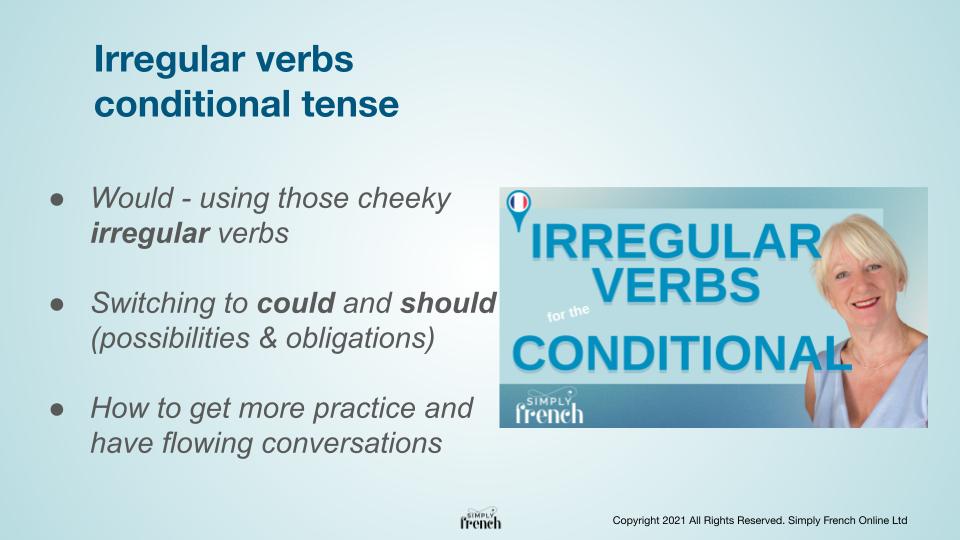
How do you translate WOULD in French?
Think about it…How would you translate would on its own? Well, it’s impossible! Because it does not mean anything without a verb.
In English, when you see "would", which is a modal, by the way, you know you are dealing with the conditional.
Conversely, there are other ways to identify the conditional in French. To be more specific, the structure of the conditional in French will help you. Let’s dive in!
Here’s an example for you:
- Je mangerais >>> I would eat.

What’s the pattern for the French conditional?
What is an easy way to recognise the conditional?
Firstly, as it's from the future stem, just like the future, you will hear the letter R at the end of the verb:
Je mangeRais Je le feRais Je n'iRais pas sans toi etc
Secondly, think about this method:
- WHO - WHAT - WHEN
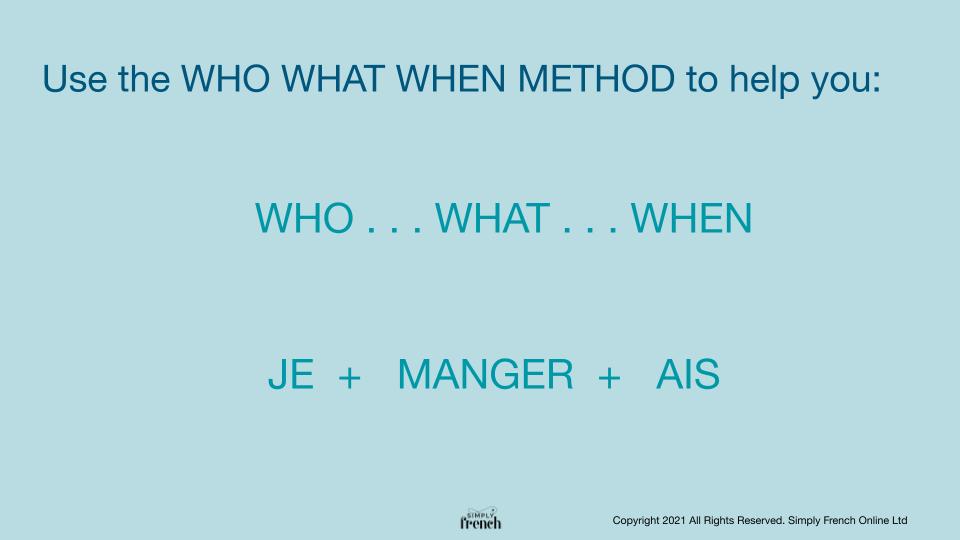
In other words, you’ll have the subject, the verb or root, and the ending that indicates the conditional.
Let’s deconstruct our previous example:
- Je mangerais >>> I would eat.
- WHO = Je >>> I
- WHAT = manger >>> eat
- WHEN = ais >>> would
As you can see, it’ all seems back to front, Or you could pay attention to the ending first, then check if you have an infinitive and confirm with the subject.
Why? Because the ending is the same at the imparfait. If you are not familiar with it, this tense is used for habits in the past or descriptions and long actions in the past.
And the ending for WOULD are the same as the imperfect, only you have that letter R in there as well:
- ais
- ais
- ait
- ions
- iez
- aient
But for the conditional, there’s an infinitive or the “non conjugated verb”. In this article, I explain more about the infinitive and you will learn how to say “I’ve just…” in French:
VENIR DE: to have just (done something) in French
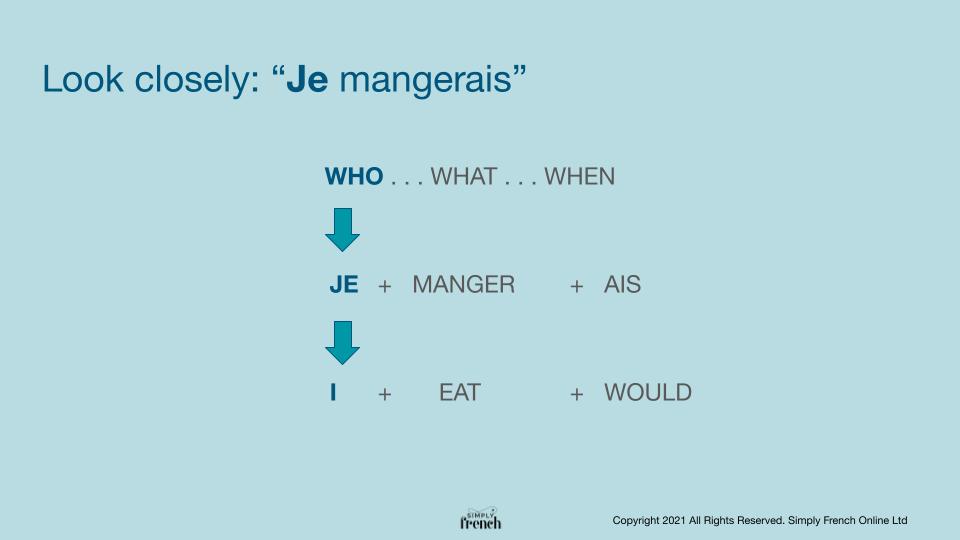
How do you conjugate the French present conditional?
You have just seen an example in the previous section. Time to practise…First, put your infinitive then add the corresponding endings.
Let’s play with the French verb donner meaning to give.
- Je donnerais >>> I would give
- Tu donnerais >>> You would give
- Il / elle donnerait >>> He/she would give
- Nous donnerions >>> We would give
- Vous donneriez >>> You would give
- Ils / elles donneraient >>> They would give
Note that for the pronunciation it’s exactly the same for all the subjects except for “nous” and “vous”. Easy!

Talking about pronunciation, be aware that the “r” is super strong (and guttural) in French. This going to help you identify the conditional because it’s part of the infinitive!
However, in the verb “donner”, you drop the sound of that letter “e”... (it almost sounds like "Je donnRais")

ER verbs are regular. Let’s have another example with the verb aimer (to like / love).
- J’aimerais >>> I would like
- Tu aimerais >>> You would like
- Il / elle aimerait >>> He/she would like
- Nous aimerions >>> We would like
- Vous aimeriez >>> You would like
- Ils / elles aimeraient >>> They would like
So, what happens with irregular verbs / infinitives?
What happens with irregular infinitives?
At this stage, you should understand how to conjugate any regular French verb for the present conditional. Now, I’m going to show you how it works with irregular verbs.
Truth is…it’s super easy! If your irregular verb naturally ends with “r”, you keep it like this. Here’s a list of some of them:
- voir >>> to see
- savoir >>> to know
- dormir >>> to sleep
- choisir >>> to choose
- finir >>> to finish
However, if your verb, or infinitive I should say, ends with “e”, simply remove it and add the corresponding endings of the present conditional.
Let’s have a look at some infinitives with “e”:
- boire >>> to drink
- vendre >>> to sell
- attendre >>> to wait
- perdre >>> to lose
- prendre >>> to take
- descendre >>> to go down
And with real examples, you would have this:
- Je vendrais >>> I would sell
- Tu boirais >>> You would drink
- Il perdrait >>> He would lose
- Elle descendrait >>> She would go down
- On prendrait >>> One would take
- Nous attendrions >>> We would like
- Vous rendriez >>> You would return
- Ils dépendraient >>> They would depend
- Elles répondraient >>> They would answer

The spelling differentiates 2 tenses.
If you hear these 2 examples, you won’t be able to distinguish them since they share the exact same pronunciation. However, if you see them, you will notice one extra letter for the conditional and it makes all the difference. This happens only with the first person of the singular “je” though.
Let’s see some examples with the future tense:
- Je donnerai >>> I will give
- Je répondrai >>> I will answer
- Je ferai >>> I will do
- Je serai >>> I will be
Now, pay attention to the present conditional with the same examples:
- Je donnerais >>> I would give
- Je répondrais >>> I would answer
- Je ferais >>> I would do
- Je serais >>> I would be
Therefore, only the spelling and the context will guide you. For the other subjects, you will easily spot the difference between the future and the conditional.

What are the irregular conditionals in French?
As long as you have one pattern, you can put the correct ending for each person. That is why I am giving you the following examples of irregular conditionals so you can conjugate them with the other pronouns:
- J’irais >>> I would go
- Tu ferais >>> You would do
- Il aurait >>> He would have
- Elle serait >>> She would be
- On voudrait >>> One would want
- Nous devrions >>> We would have to
- Vous pourriez >>> You would be able to
- Ils sauraient >>> They would know
- Elles verraient >>> They would see
The good news is if you already know your future tense in French, you simply switch the endings. If not, you’ll have to learn them little by little because you can’t use their infinitive form. By the way, if your native language is Spanish or if you can speak it, you’ll see some similarities!
- Ir (Spanish) >> aller >> to go
- Ser (Spanish) >> être >> to be
- Ver (Spanish) >> voir >> to see

How do you translate could in French?
In English, the modal “could” means the possibility and is contained in itself. You just add an infinitive to explain what the person can do or not.
However, in French, you need the conditional of “to be able to”.
Pay attention to these examples:
- Je mangerais >>> I would eat
But, with could, it will be like this:
- Je pourrais manger >>> I could eat
In a nutshell, whenever you wish to express “could” in French, stick to the conditional of “pouvoir”.
Here’s its full conjugation:
- Je pourrais >>> I could
- Tu pourrais >>> You could
- Il / elle pourrait >>> He/she could
- Nous pourrions >>> We could
- Vous pourriez >>> You could
- Ils / elles pourraient >>> They could

How do you express should in French?
It’s exactly the same thing with the modal “should”. Indeed, “could” means the obligation (or to give advice) and is contained in itself. You just add an infinitive to explain what the person has to do or not.
How do you translate it into French? You will opt for the conditional of “would have to”.
Let’s go back to our previous example but with the obligation:
- Je devrais manger >>> I should eat
As long as you know the conditional of “devoir”, you are good. Don’t forget to add the infinitive after…
Here’s its full conjugation:
- Je devrais >>> I should
- Tu devrais >>> You should
- Il / elle devrait >>> He/she should
- Nous devrions >>> We should
- Vous devriez >>> You should
- Ils / elles devraient >>> They should
Note that you can have the same structure to express “ought to”.
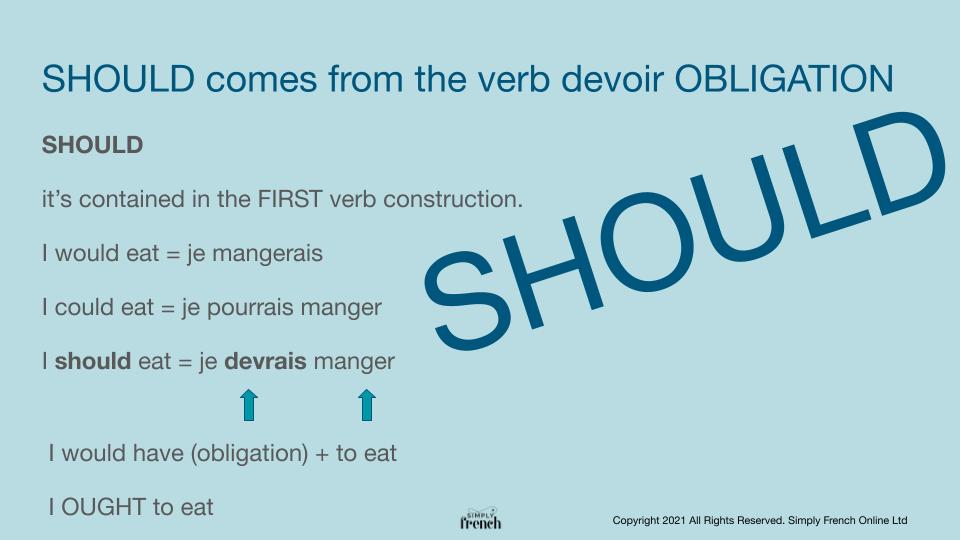
How do you make this REAL and get it to come easily in conversations?
I would love to share with you some tips that my students apply from now on.
First, practice with one verb in realistic conversations in order to be fluent with this verb.
Then, don’t overload your memory with too many verbs. Again, choose a verb and practice with it. As soon as it becomes natural for you, you can start practising with another verb. Besides, oui you can learn by drill but don’t stick with it.
Remember how you learned your numbers? Yes, it was in order but if you want the number 30, you won’t count from 1!
Basically, you master a conjugation when you know the exact tense for a precise verb and specific subject.
Stimulate your brain. Don’t be afraid to go out of your comfort zone! Try new sentences, learn from your mistakes…
Finally, say it loud because you may be able to conjugate it perfectly but with … an English pronunciation. The best thing you can do is to record your own voice and compare it to a native speaker’s version. Even better, have conversations with native people and get instant feedback if you ask them to do so.
The best context would be to join our groups at Conversation Café because my hosts and I know how to listen to our students and give them proper feedback in a safe place.
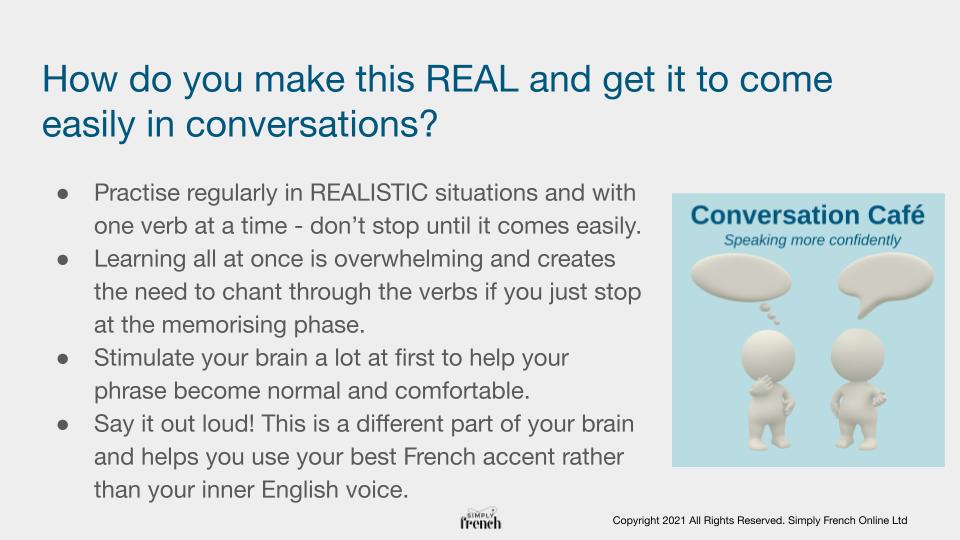
To summarise, if you know the future tense, the present conditional will be super easy. Simply learn the endings.
Start with regular verbs, then continue with an irregular verb, then another one, etc.
Don’t forget that “could” and “should” require a specific verb: “pouvoir” and “devoir” in French.
Enjoy your learning and if you have any questions, as always, I’d be delighted to answer them.
Free Masterclass
Learn my 4 step method of how to hold meaningful french conversations the R.E.A.L. way in just 30 minutes a day.
When you signup, we'll be sending you weekly emails with additional free content

